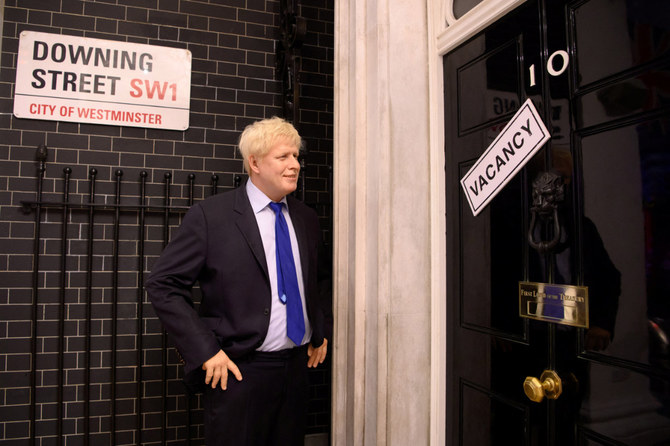The Day of the Narcissist: how Boris brought himself down

https://arab.news/gayh5
In The Day of the Jackal, the gripping thriller in which the far-right paramilitary Organization Armée Secrète hires an assassin to shoot French President Charles de Gaulle, author Frederick Forsyth says of his English gentleman killer: “Like all men created by systems and procedures, he did not like the unpredictable and therefore the uncontrollable.” In real life, it was precisely these qualities that did for British Prime Minister Boris Johnson. Rather than being laid low by a cabal of others, Johnson has been brought down by his worst enemy: himself.
As regular readers of this column know, we have scented blood in the water regarding Johnson’s political future for quite some time. The political risk key to understanding the outgoing prime minister, more than is true for most leaders, is a comprehensive study of his biography and psychology. For while many are in politics to further a particular ideology — the great British Prime Minister Margaret Thatcher and “Thatcherism” come to mind — Johnson, disturbingly in tune with this era of the selfie, seemed to revel in being in the arena only as a form of self-aggrandizement.
It was entirely predictable that, unlike the recent prime ministerial resignations of David Cameron, Theresa May, or indeed Thatcher herself — all of whom in the end went gracefully — Boris would cling on to power in Downing Street, his fingernail marks still on the walls as a torrent of over 50 Cabinet members, junior ministers and parliamentary private secretaries quit over his careless, sloppy, appointment of a government whip with a shady history of sexual harassment, only then to (predictably) lie about his knowledge of the man’s past.
A series of senior civil service figures, shocked into action, charged that not only had Johnson been well aware of this man’s murky proclivities, but that they had personally briefed him about the danger. Caught once again in a bare-faced lie, the great dissembler in the end simply couldn’t wriggle out of his predicament.
Even after the mortal damage of “Partygate,” when the prime minister had been caught prevaricating about attending lockdown parties while the rest of the country was sternly admonished to quarantine, Johnson had learned nothing and surely felt no genuine remorse —either for his baseline narcissistic view that the rules of life are for little people, or for his belief that it is always OK to lie when he is in a jam. Instead, in line with these ugly, egocentric days, the prime minister seemed to feel wronged in being held to any standards at all. For anyone who has followed Johnson’s career, analytically this was entirely predictable.
His brazenly selfish actions amount to another corrosion of the political norms that hold the West together
Dr. John C. Hulsman
The most telling moment came when Michael Gove, the one truly able man in the Cabinet and its “big beast,” came to the prime minister in the time-honored manner of British political culture. The British constitution — not written down, but rather a series of centuries-old traditions, customs, and norms — dictates that a figure of such gravitas does precisely this. Gove, long a rival but lately an ally of Johnson, privately told him that the gig was up, that with the party in full revolt following his being caught in a lie yet again, he simply had to go.
As one dissenting Tory MP aptly it, placing the incident in the terms of a good Evelyn Waugh novel, Gove offered Johnson a metaphorical whisky and a revolver, and urged him to do the decent thing. But this was a ludicrous error: Boris has never done the decent thing in his entire life — why would he start now? Instead, he shamelessly drank the whisky and turned the revolver on Gove himself, accusing him of disloyalty.
Personally, I was unsure whether to laugh or to cry. I wanted to laugh, because over these past stormy months my firm has called the Johnson saga perfectly because of our forensic knowledge of his biography and his character (or lack of it). I wanted to cry because his brazenly selfish actions amount to another corrosion of the political norms that hold the West together. The very notion that there is anything beyond oneself — a cause, the people a leader serves, the country itself — seems increasingly to be a quaint anachronism. Yet without a higher belief, one is left only with the unedifying scene of Johnson pathetically clinging to office like a barnacle on the side of the ship of state, craving power for its own sake.
It is in this darker context that Johnson’s absolutely appalling resignation speech must be viewed. Devoid of any form of self-reflection, the outgoing leader (about to earn millions on the lecture circuit) blithely put his demise down to bad luck (“them’s the breaks”) and the “herd instinct” of his own party — who, like gazelles frightened by the wind, had turned on him for no understandable reason. Not once did he mention his double-standard view of a world in which he could turn No. 10 into a disco while the British public were unable to comfort family members dying of COVID, or his serial lying to cover his inept tracks.
No, an OAS assassin was not needed to bring Johnson down; by far his greatest enemy was himself. It truly was The Day of the Narcissist.
• John C. Hulsman is the president and managing partner of John C. Hulsman Enterprises, a prominent global political risk consulting firm. He is also a senior columnist for City AM, the newspaper of the City of London. He can be contacted via johnhulsman.substack.com.







































